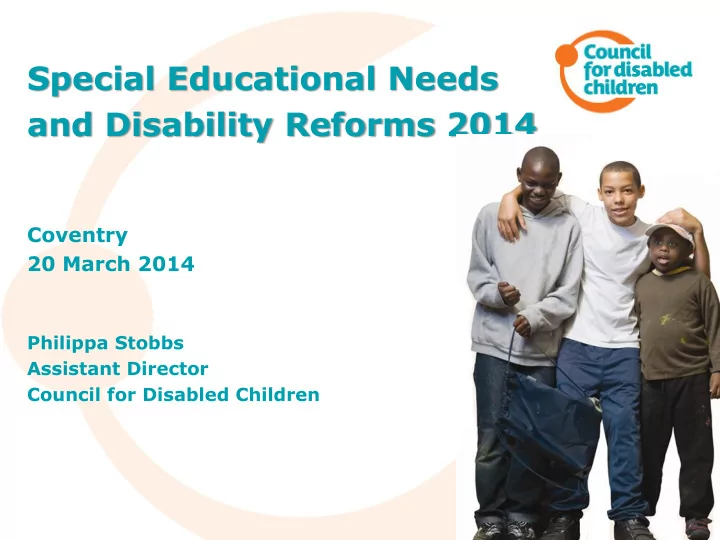

Special Educational Needs and Disability Reforms 2014 Coventry 20 March 2014 Philippa Stobbs Assistant Director Council for Disabled Children
SEND reform • Timescales • Broad architecture • Schools’ provisions • Principles
SEND reform 2010 Aut Ofsted review: A statement is not enough DfE call for evidence 2011 Mar Support and Aspiration: A new approach to SEN and disability 2011 Sept Pathfinders started 2012 May Support and Aspiration: A new approach to SEN and disability: Progress and Next Steps 2012 Sept Draft provisions 2012 Pre-legislative scrutiny by Education Select Sept - Dec Committee 2012 Dec Education Select Committee publishes report Pathfinder extension announced
SEND reform 2013 Feb Children and Families Bill introduced into Parliament 2013 Mar Commons Committee Stage Draft Regulations Draft Code of Practice ‘Indicative’ 2013 Oct Scrutiny in the House of Lords Code of Practice consultation Consultation on Regulations and Transitional arrangements 13 Mar Royal Assent 2014 2014 Code of Practice published Early Transitional arrangements published 2014 Sept Implementation
An important reminder: All current requirements stay in place until: new legislation is implemented new regulations come into force new Code of Practice is issued
Children and Families Act: Part 3 • Principles • Definitions and scope • Local integration of health, care and education and joint commissioning • Education, health and care needs assessment & plans • Personal budgets • Local offer • Schools’ provisions • SEN Code of Practice
Definitions and scope • SEN definition the same • From birth and up to 25 • Young offenders • LA and all children & young people in area with SEN: – LA to identify – LA responsibility • Strategic duties include disabled children and young people • All schools’ duties apply to directly to academies
Local offer • Support available for children and young people with SEN and disabilities • Regulations: – what the local offer should include – who should be consulted – complaints mechanism • Develop the offer with parents, schools, colleges, other services • Must include provision to support transition to adulthood
Education, health and care needs assessment & plans • EHC plans replace statements and 139A assessments • EHCP extends to FE, training, an apprenticeship or if ‘NEET’ (not in education, employment or training) • Other provisions similar to a statement • Regulations set out how assessment conducted • Duty to secure special educational provision in EHCP • Duty to secure health care provision • Strengthened duty on social care • Health & social care needs to be recorded in EHCP • Rights of appeal the same, but include FE • Admission to a special academy or free school without an EHC plan
Local integration of health, care and education • Integrate services to promote the well-being • Joint commissioning by LAs & CCGs • SEN and disability • LAs to keep education & social care under review • Requirement to co-operate to meet EHC needs: – Schools – Colleges – Local authorities, including social care – Alternative provision – Health agencies
Changing health structures • Health and Well-being Boards • Joint Strategic Needs Assessment • Health and Well-being Strategies • Arrangements for co-operation to improve children’s well -being • Work in 2012 by Children and Young people’s Health Outcomes Forum • Healthwatch
School provisions • Provisions apply to academies • Requirements to: – have a SENCO – inform parents if child has SEN – inform young people – use ‘best endeavours,’ schools and FE – publish information on how they meet the needs of children with SEN
Draft SEN Code of Practice • Revised Code of Practice • Removal of School Action and School Action Plus; introduction of ‘SEN Support’, graduated response • External specialists at any point • Individual education plans will not be required by the Code; schools required to keep records • Removal of behaviour from ‘behavioural, emotional and social difficulties.’ New term, ‘social, mental and emotional health’ • Evidence of a relevant and purposeful response
A changing context for schools • Curriculum and assessment • School funding changes • Health changes
Principles General principles for local authorities: • views, wishes and feelings of children, young people, parents • importance of full participation in decision- making • importance of information and support • children’s development and best possible outcomes Disability in Part 3 Children and Families Bill
Council for Disabled Children website http://www.councilfordisabledchildren.org.uk/ Council for Disabled Children 8, Wakley Street London EC1V 7QE tel: +44 (0)20 7843 1900 fax: +44 (0)20 7843 6313
Recommend
More recommend